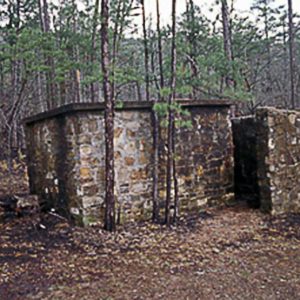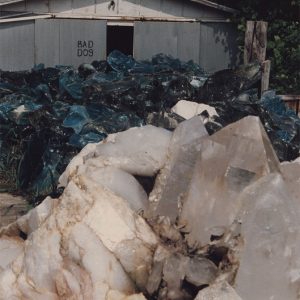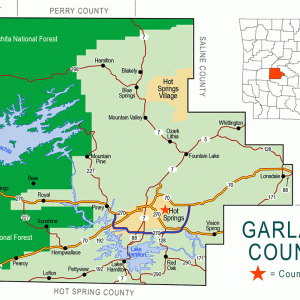calsfoundation@cals.org
Jessieville (Garland County)
Jessieville (Garland County) is an unincorporated community located in the Ouachita Mountains northwest of Hot Springs Village (Garland and Saline counties) and fourteen miles north of Hot Springs (Garland County). Accessible by Arkansas Highway 7, Jessieville serves as a bedroom community for Hot Springs and offers services to visitors to the Ouachita National Forest.
Early families in the area that would become Jessieville first appear in the 1860 census. Part of Marble Township in what was then Saline County, the area was sparsely settled. Farmers James and Mary Newkirk resided in the township east of the present location of Jessieville with their six children. In 1873, the western portion of Marble Township in Saline County became part of the newly organized Garland County. The Jessieville Post Office began operations in 1889 and continues to operate in the twenty-first century. The community is named for the daughter of early postmaster Squire Gillenwaters.
Early land patents issued in the area include Charles Kilgore, who received 160 acres in 1897, and George McLane, who received eighty acres in 1899. In the 1900 census, the widower Kilgore lived with his son and daughter on the property. The last two patents issued for the area include sixty acres to Monroe Young in 1924 and just under 160 acres the next year to Jerry Booth. Young appeared in the 1930 census with his wife and three children, farming the land along Arkansas Highway 7.
Farming supported many of the early residents. Other businesses related to the abundant timber in the area, including a stave mill, also operated in Jessieville. Settlers in the area remained connected to the city of Hot Springs to the south with eighty-four telephones in operation in the community in 1894. Marble Missionary Baptist Church, located to the east of the community, organized in 1848 and remains active in the twenty-first century.
The Ku Klux Klan in the area opposed bootlegging in the early 1920s. A group of hooded and robed Klansmen interrupted a church meeting in nearby Lonsdale (Garland County) in 1922 to warn worshippers against bootlegging. The following night, several members of the Klan from Hot Springs tried to interrupt a movie showing at the Jessieville school to discourage moonshine production in the area. They were ambushed by three bootleggers outside of the school, and a gun battle erupted. In the ensuing shootout, one Klan member was killed, while two more were wounded.
Education played an important role in the development of the community. Early schools in the area included Ballew Springs, Central, Bethlehem, and Marble. In 1931, local citizens initiated a petition for a consolidated district. Approved by both the county and state boards of education, the district organized slowly under the leadership of the new board composed of five former members of the now consolidated districts. For the first three years of operation, the schools continued to educate students in the first through eighth grades. In 1934, the district renovated the former Jessieville Baptist Church to house the lower grades and began constructing a new school on land donated by the U.S. Forest Service. Named the Rock Building due to the stones used in the construction, it opened for the 1936–37 school year, when six students graduated. The building continues to be used by the district for administrative purposes in the twenty-first century, with newer buildings housing students. In 1949, the Rock Springs, Mount Tabor, and Avant school districts consolidated with Jessieville. The 1951 high school enrollment was estimated to be between thirty and thirty-five students when the basketball team defeated the Little Rock Central High School Tigers. Efforts to consolidate the district in the 1950s due to low enrollment were unsuccessful. In the 2018–19 academic year, the district enrolled 848 students.
In 1985, two staff members at Jessieville High School created a fictitious local sports team, the Village Academy Beavers, whose fake scores were printed for three years in the state’s top newspapers before the deception was discovered.
Located directly south of the Ouachita National Forest, the community hosts the Jessieville/Winona Fourche Ranger District headquarters. Other institutions in the community include several churches, a restaurant, and a volunteer fire department founded in 1985. The First Baptist Church in Jessieville began in 1915 and moved into a new complex in the 1980s. Quartz crystal mines also continue to be active in the area in the twenty-first century. Other businesses are located just south of the community in Blue Springs (Garland County) and Hot Springs Village. Several structures near Jessieville are listed on the National Register of Historic Places, including the CCC Company 3767 Powder Magazine Historic District and several components of the Iron Springs Recreation Area.
On October 4, 2023, a natural gas transmission line ruptured near Jessieville, forcing the evacuation of area residents for several hours.
For additional information:
Anthony, Isabel. Garland County, Arkansas: Our History and Heritage. Hot Springs, AR: Garland County Historical Society, 2009.
———. “The Ouachita National Forest: 75 Years Younger than Hot Springs National Park.” The Record 48 (2007): 58–64.
Duren, Don. “Jessieville Cagers Upset Little Rock and El Dorado.” The Record 59 (2018): 7.1–7.4.
Marble Township, Garland County, Arkansas. Hot Springs, AR: Garland County Historical Society, 2005.
Newkirk, Gayle. “Pruning the Branches: The Newkirk Family in Garland and Saline Counties.” The Record 59 (2018): 13.1–13.36.
Robbins, Elizabeth. “Garland County Rural Schools.” The Record 48 (2007): 65–96.
Showers, David. “Natural Gas Pipeline Blows near Jessieville.” Arkansas Democrat-Gazette, October 5, 2023, pp. 1B, 2B. Online at https://www.arkansasonline.com/news/2023/oct/05/natural-gas-pipeline-blows-near-jessieville/ (accessed October 5, 2023).
“Time Tour: Bootlegging in Garland County,” The Sentinel-Record, https://www.hotsr.com/news/2020/may/07/time-tour-bootlegging-garland-county/ (accessed November 19, 2020).
Ward, Euel. “Jessieville Baptist Church.” The Record 48 (2007): 101–103.
David Sesser
Henderson State University







Comments
No comments on this entry yet.